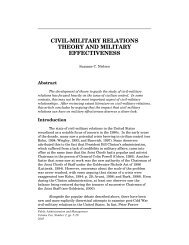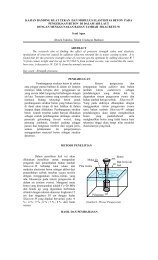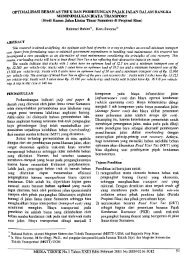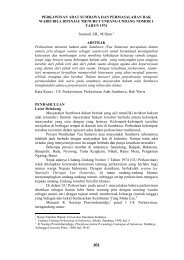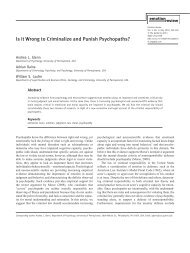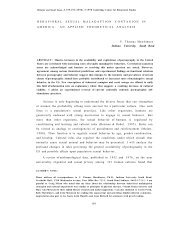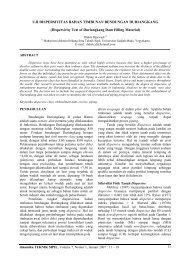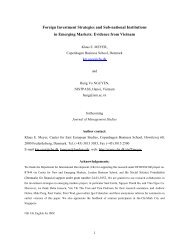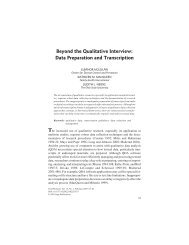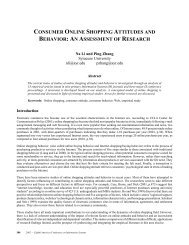The Invisible Black Victim: How American Federalism Perpetuates ...
The Invisible Black Victim: How American Federalism Perpetuates ...
The Invisible Black Victim: How American Federalism Perpetuates ...
You also want an ePaper? Increase the reach of your titles
YUMPU automatically turns print PDFs into web optimized ePapers that Google loves.
them, particularly as narrow law-andorder arguments were used to implicate <strong>Black</strong>s in riots<br />
and other undesirable activities and to undermine civil rights claims (Beckett 1997; Flamm<br />
2005; Murakawa 2005; Weaver 2007).<br />
One of the consequences of this episodic nature of crime on the congressional agenda is that<br />
attention tends to cluster around highprofile issues and events and to be decoupled from<br />
larger, ongoing social policy concerns. To some extent, this is a result of the fact that<br />
Congress's clearest jurisdiction on crime issues is oversight of federal agencies, financial<br />
institutions, border control, and crossstate law enforcement, not a broad mandate to address<br />
social problems. Most crime hearings take place in the Senate or House Judiciary Committees<br />
or Special Narcotics committees, and hearings are generally not held in conjunction with<br />
other committees (only 89 hearings [4 percent] between 1971 and 2000 were held jointly with<br />
another committee). While the standard crime committees have a broad mandate, they rarely<br />
intersect with other committees that deal with the social and economic environments that<br />
create criminogenic conditions. Beyond the primary committees of Judiciary and Narcotics,<br />
the other major committees holding crime hearings are Government Operations and Foreign<br />
Affairs. Table 1 illustrates committees that held hearings on crime topics that might involve<br />
concerns about racial inequality over the 30-year period: drugs, juveniles, riots and crime<br />
prevention, and police/prisons.<br />
For riots and crime prevention issues, the Select Committee on Aging held hearings almost<br />
exclusively on crimes against the elderly, clearly not a focus on racial inequalities. More than<br />
threequarters of drug hearings were held in Judiciary, Select Narcotics, Foreign Affairs, or<br />
Government Reform/Oversight committees, also not committees likely to address underlying<br />
causes of crime. For juveniles, the major non-Judiciary committee is the House Education<br />
and Labor/Workforce Committee. This appears to be the one issue area where Congress<br />
connects crime to broader social problems. Thirty-eight percent of juvenile<br />
delinquency/justice hearings are held in this committee. <strong>How</strong>ever, juvenile issues come and<br />
go from the congressional agenda, rarely address inequities across race and class, and only<br />
infrequently result in legislation focusing on improving the living conditions of youth. Other<br />
than these, few hearings were held in any committee that might have the authority to craft<br />
legislation addressing the larger social problems of inequality that contribute to inequities in<br />
the justice system.<br />
Congressional attention to crime is also dominated by ''state-ofthe- problem'' hearings with no<br />
proposed legislation, program, or activity at stake. Across the same four substantive crime<br />
categories (drugs, juveniles, police/weapons, and riots/crime prevention) and over 967<br />
hearings, only 21 percent considered new legislation, and a microscopic 2 percent considered<br />
new programs or agencies.9 Only 14 percent (30/208) of all drug hearings held during the<br />
Reagan administration were addressing any proposed legislation. Two juvenile justice<br />
hearings considered new programs for juvenile delinquency prevention and runaway youth,<br />
and another considered an act that would consolidate youth programs into block grants.10<br />
Three police/prison hearings and two riots/crime prevention hearings considered programs,<br />
but none of these hearings addressed racial inequality in any manner or were designed to<br />
address the relationship between crime and other problems of inequity in resources,<br />
neighborhoods, or living conditions.<br />
<strong>The</strong> lack of coordination with committees that could connect crime to a wide array of other<br />
social problems facing low-income minorities and the limited attention to actual laws and<br />
programmatic solutions illustrate the relatively easy decoupling of these issues at the national



